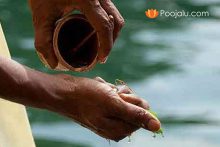Description
Significance of Pitru Paksha or Mahalaya Paksha
Pitru Paksha, also known as Shraadh or Mahalaya Paksha, is a 16-day period in the Hindu lunar calendar dedicated to performing rituals and offerings to honor one’s ancestors or Pitrus (Pitri in Sanskrit). It typically falls in the lunar month of Bhadrapada, which corresponds to September-October in the Gregorian calendar. Pitru Paksha is considered a time when the souls of deceased ancestors are believed to visit the Earth, and it is essential to perform rituals to provide them with offerings and pay homage to them.
Pitru Paksha Dates 2024
| Date | Day | Date | Day |
| September 17, 2024, Tuesday | Purnima Shradh | September 24, 2024, Tuesday | Ashtami Shradh |
| September 18, 2024, Wednesday | Pratipada Shradh | September 25, 2024, Wednesday | Navami Shradh |
| September 19, 2024, Thursday | Dwitiya Shradh | September 26, 2024, Thursday | Dashami Shradh |
| September 20, 2024, Friday | Tritiya Shradh | September 27, 2024, Friday | Ekadashi Shradh |
| September 21, 2024, Saturday | Chaturthi Shradh | September 29, 2024, Sunday | Dwadashi Shradh |
| September 21, 2024, Saturday | Mahabharani | September 29, 2024, Sunday | Magha Shradh |
| September 22, 2024, Sunday | Panchami Shradh | September 30, 2024, Monday | Trayodashi Shradh |
| September 23, 2024, Monday | shashthi sharad | October 1, 2024, Tuesday | Chaturdashi Shradh |
| September 23, 2024, Monday | Saptami Shradh | October 2, 2024, Wednesday | Sarva Pitru Amavasya |
Here are some key aspects of Pitru Paksha Puja:
- Dates: Pitru Paksha typically starts on the Pratipada (first day) of the Krishna Paksha (waning phase of the moon) in the lunar month of Bhadrapada and ends on the Amavasya (new moon day) of the same month. It lasts for 16 lunar days.
- Importance: Hindus believe that performing Pitru Paksha rituals helps appease the souls of deceased ancestors, seek their blessings, and ensure their well-being in the afterlife. It is considered an essential duty to honor one’s forefathers during this period.
- Rituals: The primary rituals during Pitru Paksha include Tarpana (offering of water and sesame seeds), Pinda Daan (offering of rice balls), and other offerings of food, clothes, and items for the departed souls. These rituals are typically performed near a river, sacred water body, or at designated Pitru shrines.
- Pitru Tarpana: Tarpana involves offering water mixed with black sesame seeds, rice, and barley to the departed souls. The person performing the rituals usually faces south and offers prayers for the ancestors’ peace and salvation.
- Pinda Daan: Pinda Daan involves making rice balls mixed with sesame seeds and offering them to the ancestors. The number of rice balls offered may vary depending on the specific customs and the number of generations of ancestors being honored.
- Food Offerings: In addition to Tarpana and Pinda Daan, food offerings such as cooked rice, vegetables, and sweets are also made to the ancestors. It is believed that the souls partake of the essence of these offerings.
- Prayers and Mantras: Various prayers and mantras are chanted during the rituals to invoke the blessings of the ancestors and seek their forgiveness for any shortcomings.
- Donations: It is considered virtuous to make donations to the needy and perform acts of charity during Pitru Paksha as a way to earn merit for the ancestors.
- Shraddha Ceremony: On the last day of Pitru Paksha, known as Sarvapitri Amavasya or Mahalaya Amavasya, a grand Shraddha ceremony is often performed to conclude the period of ancestral worship.
- Astrological Considerations: The specific dates for Pitru Paksha may vary each year based on the Hindu lunar calendar and astrological considerations.
It’s important to note that the rituals and customs associated with Pitru Paksha may vary among different Hindu communities and regions. Individuals usually perform these rituals with a sincere heart, seeking the well-being and spiritual progress of their ancestors. Click here to Book a Pandit for Pitru Paksha









S V Shabari Girish –
Very nicely done by Bheema Garu and thanks for excellent coordination by poojalu management